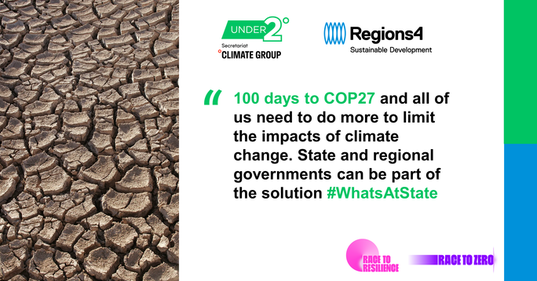When we launched our joint Under2 Coalition and Regions4 campaign - What’s at State? - 100 days out from COP26, we asked our member governments what they stood to lose if urgent action is not taken on climate change. 21 states, regions and partners answered the call.
Under2 Coalition co-chair, Chungnam, detailed an increase in native endangered species, Campeche in Mexico raised concerns about falling water levels in the Balam Kú State Reserve and the Basque Country warned against the dangers rising sea levels pose to its coastal areas. There was a common theme around the ways in which increasing global temperatures are having an impact where we live, now. This is not just a global problem, but a local one too.
COP26 recognised the role of non-state actors more than any COP has done before. States, regions, cities and other groups were vocal not just about the need to act but about the fact that many of them are acting now - and their examples can provide a blueprint for national governments to do the same.
States and regions are in the unique position of being able to pass laws and enact policies locally that are tailored to the specific challenges they face. Working with communities they can respond to environmental issues faster than their national counterparts. They can also take action where national governments cannot - or will not - progress the climate cause and they can show greater ambition. In 2021, for example, the number of states and regions with a net zero commitment was more than double the 2020 figure.
At a time of drought, wildfires and climate-induced migration, much debate has now moved to how humanity can adapt to climate change. This does not mean we should stop efforts to cut harmful emissions, to regulate polluting industries or to reach net zero as soon as possible. But it does mean coming to terms with new realities and finding ways to manage them as best we can. This could mean planting trees, building flood barriers, or changing lifestyles.
Following their commitments at COP26, national governments, particularly in developed countries, must deliver on their adaptation commitments – including by doubling finance for adaptation by 2025 based on 2019 levels. If this does not happen, it will be the poorest and most vulnerable that continue to suffer the most.
This crisis is here, now and it is double-pronged. Alongside a climate crisis we have a biodiversity one too, with species being lost at a faster rate than at any time in recorded human history. Every loss heightens the dangers of a warming world because of the unique contribution each species makes to the wider environment. We simply cannot afford to keep losing species and raising emissions levels.
Governments at every level need to work together to find solutions that will halt, and ultimately reverse, the alarming climate trends we are now seeing. This year Regions4 and the Under2 Coalition will once again be showing what states and regions fear losing in the climate crisis but also - crucially - what they are doing to make a difference. And we need all of them to be raising their ambition even further.
At COP27 we need all voices to be heard, no matter how small, and we need to ask ourselves: if we don’t act now to protect our planet, then when?
